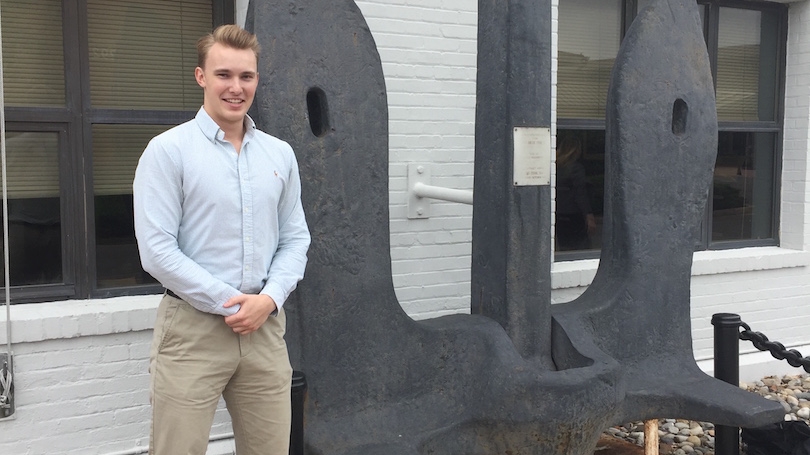
- Public Policy
- Leadership
- Funding
- News & Events
- About the Center
Back to Top Nav
Back to Top Nav
Back to Top Nav
Back to Top Nav
Marcus Thompson ’19 interned with the Naval History and Heritage Command for the Spring 2017 term. The following is an excerpt from his internship report.
This past spring, I had the opportunity to intern at the Naval History and Heritage Command (NHHC) which is an Echelon II command of the US Navy dedicated to supporting the Navy’s mission through public affairs, historical analysis, and direct mission support. While interning at NHHC, I was able to contribute to all aspects of this mission. Working out of the Naval library and archives at the Washington Naval Yard, I accessed exclusive primary sources and official histories otherwise unavailable to the public. During my internship, I worked with Dr. John Sherwood, an expert in Naval operations in the Vietnam War and in Libya. He has been an invaluable teacher and mentor. I am confident my research, historical writing, and grasp of military history have improved immensely due to this internship.
While at NHHC, I had five main projects. My first assignment was to support the Chief of Naval Operations (CNO) Admiral John Richardson. I researched and wrote an essay on Naval history in Guam, the site of a CNO visit in mid-May. My second, third, and fourth assignments were essays regarding Naval operations in Operation Avalanche, the Allied invasion of Salerno, Italy in 1943. My first essay on the subject was about the operation’s general history while the following two essays focused on Naval Gunfire Support (NGFS) and minesweeping, respectively. These articles are to be published in “The Sextant,” the Navy’s official history magazine, in July of 2018. My final project was an essay on the US seizure of Guam during the Spanish-American War and the subsequent political fallout on the island. When I was researching Guam’s capture in 1898, I noticed dissonance between sources. The popular narrative implied that a naturalized American citizen on the island was named interim governor in the absence of any official US authority, but one version of the story relied on a skewed interpretation of a single source. My essay dug into various secondary and primary sources and analyzed their accuracy to create my own interpretation of the events. This essay will be published on the Naval Historical Foundation’s blog.
During my internship, I was able to further explore my career aspirations by meeting a plethora of junior officers and enlisted personnel in the US Navy. I participated in Command PT and even completed the Navy Physical Readiness Test (PRT) at Joint-Base Anacostia Bolling alongside officers and sailors. I left NHHC very comfortable with and grateful for the connections I had made both in the intelligence community and the Navy. I have a strong interest in pursuing both fields upon graduation. NHHC’s internship program is highly personalized and flexible. I worked on a deadline basis rather than hourly and accumulated a solid portfolio of forthcoming publications and mission support. Consequentially, I had the opportunity to tour the Pentagon, NGA, and pursue research opportunities outside of the Naval library.
The research skills, connections, and portfolio I acquired made this internship a valuable opportunity. I would highly recommend this internship to anyone with an interest in the Department of Defense and Naval history. I encourage any Dartmouth student interested in History, the military, and foreign affairs to apply during their freshman or sophomore years in order to develop research and writing skills and acquire connections within the intelligence community for more advanced opportunities. Additionally, all my thanks go to the Rockefeller Center for Public Policy whose help allowed me to pursue this amazing internship.